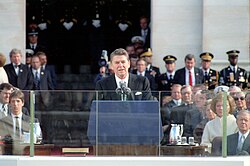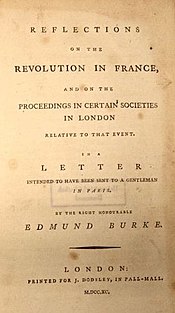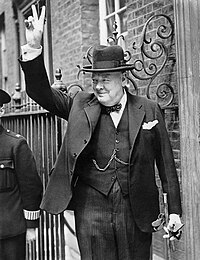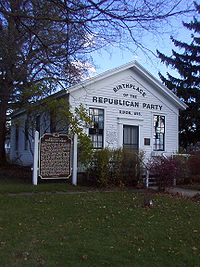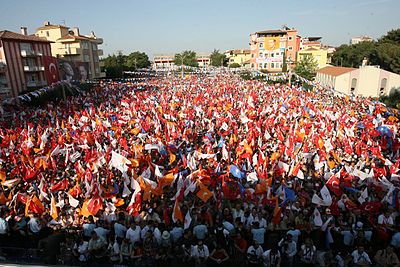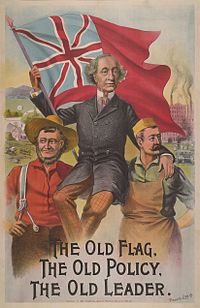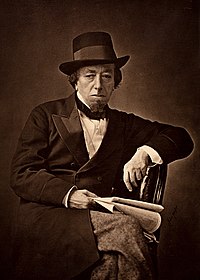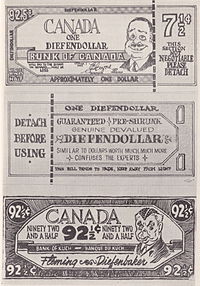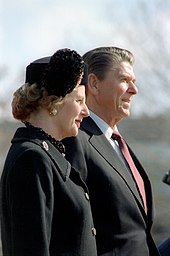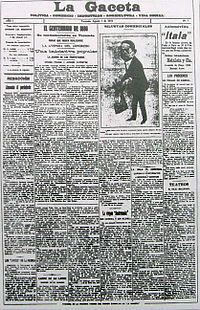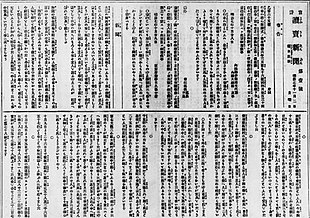Guidelines
Selected picture also includes sound and video files. The layout design for these subpages is at Portal:Conservatism/Selected picture/Layout.
- Add a new Selected picture or other file to the next available subpage. Inclusion of files such as audio and video are encouraged.
- Conservatism Featured pictures and sounds are preferred but not required
- Non-featured files should satisfy most of the critia for Featured pictures or Featured sounds
- Update the total number of Selected pictures. The current total is 30().
- Add the following template {{Conservatism SP}} to the caption article.
See also
Selected picture 1
Portal:Conservatism/Selected picture/1
In a speech at the Brandenburg Gate near the Berlin Wall on June 12, 1987, commemorating the 750th anniversary of Berlin, Ronald Reagan challenged Gorbachev (who was then the General Secretary of the Communist Party of the Soviet Union), to tear it down as a symbol of Gorbachev's desire for increasing freedom in the Eastern Bloc. It has been called "The four most famous words of Ronald Reagan's Presidency."
Later on in his speech, President Reagan said, "As I looked out a moment ago from the Reichstag, that embodiment of German unity, I noticed words crudely spray-painted upon the wall, perhaps by a young Berliner, 'This wall will fall. Beliefs become reality.' Yes, across Europe, this wall will fall. For it cannot withstand faith; it cannot withstand truth. The wall cannot withstand freedom."
Selected picture 2
Portal:Conservatism/Selected picture/2
Edward Teller (1908 – 2003) was a Hungarian-born American theoretical physicist, known colloquially as "the father of the hydrogen bomb," even though he did not care for the title.
Teller emigrated to the United States in the 1930s, and was an early member of the Manhattan Project charged with developing the first atomic bombs. During this time he made a serious push to develop the first fusion-based weapons as well, but these were deferred until after World War II. In his later years he became especially known for his advocacy of controversial technological solutions to both military and civilian problems, including a plan to excavate an artificial harbor in Alaska using thermonuclear explosives. He was a vigorous advocate of Ronald Reagan's Strategic Defense Initiative. Over the course of his life, Teller was known both for his scientific ability and his difficult interpersonal relations and volatile personality, and is considered one of the inspirations for the character Dr. Strangelove in the 1964 movie of the same name.
Photo: Greg L, Papa Lima Whiskey
Selected picture 3
Portal:Conservatism/Selected picture/3 On August 11, 1984, United States President Ronald Reagan, while running for re-election, was preparing to make his weekly Saturday address on National Public Radio. As a sound check prior to the address, Reagan made the following joke to the radio technicians:
Though this was not the first time Reagan had joked prior to giving a speech or address, the Soviet official news agency, TASS, condemned the joke, declaring that "USSR condemns this unprecedentedly hostile attack of US President" and that "this kind of behaviour is incompatible with high responsibility the heads of nuclear states are bearing for the destinies of their own people and the mankind".
Selected picture 4
Portal:Conservatism/Selected picture/4
The first inauguration of Ronald Reagan as the 40th President of the United States was held on January 20, 1981. The inauguration marked the commencement of the first four-year term of Ronald Reagan as President and George H. W. Bush as Vice President. Chief Justice Warren E. Burger administered the oath of office. Minutes later, the Americans held hostage in Iran were released.
Selected picture 5
Portal:Conservatism/Selected picture/5
The September 11 terrorist attacks were a major turning point in George Bush's presidency. That evening, he addressed the nation from the Oval Office, promising a strong response to the attacks but emphasizing the need for the nation to come together and comfort the families of the victims. On September 14, he visited Ground Zero, meeting with Mayor Rudy Giuliani, firefighters, police officers, and volunteers. Bush addressed the gathering via a megaphone while standing on a heap of rubble, to much applause:
| “ | I can hear you. The rest of the world hears you. And the people who knocked these buildings down will hear all of us soon. | ” |
Credit: Jebur
Selected picture 6
Portal:Conservatism/Selected picture/6
The traditional mascot of the United States Republican Party is the elephant. A political cartoon by Thomas Nast, published in Harper's Weekly on November 7, 1874, is considered the first important use of the symbol. In the early 20th century, the usual symbol of the Republican Party in Midwestern states such as Indiana and Ohio was the eagle, as opposed to the Democratic rooster. This symbol still appears on Indiana, New York, and West Virginia ballots.
Harper's Weekly (A Journal of Civilization) was an American political magazine based in New York City. Published by Harper & Brothers from 1857 until 1916, it featured foreign and domestic news, fiction, essays on many subjects, and humor.
Credit: Lecter
Selected picture 7
Portal:Conservatism/Selected picture/7
In 1905, Calvin Coolidge met and married a fellow Vermonter, Grace Anna Goodhue, who was working as a teacher at the Clarke School for the Deaf. While Grace was watering flowers outside the school one day in 1903, she happened to look up at the open window of Robert N. Weir's boardinghouse and caught a glimpse of Calvin Coolidge shaving in front of a mirror with nothing on but long underwear and a hat. After a more formal introduction sometime later, the two were quickly attracted to each other. They were married on October 4, 1905, in the parlor of her parents' home in Burlington, Vermont.
They were opposites in personality: she was talkative and fun-loving, while he was quiet and serious. The marriage was, by most accounts, a happy one. As Coolidge wrote in his Autobiography, "We thought we were made for each other. For almost a quarter of a century she has borne with my infirmities, and I have rejoiced in her graces."
Credit: Brian0918
Selected picture 8
Portal:Conservatism/Selected picture/8
Reflections on the Revolution in France (1790), by Edmund Burke, is one of the best-known intellectual attacks against the (then-infant) French Revolution. In the twentieth century, it much influenced conservative and classical liberal intellectuals, who recast Burke's Whig arguments as a critique of Communism and Socialist revolutionary programmes.
Edmund Burke served in the British House of Commons, representing the Whig party, in close alliance with liberal politician Lord Rockingham. In Burke's political career, he vigorously defended constitutional limitation of the Crown's authority, denounced the religious persecution of Catholics in his native Ireland, voiced the grievances of Britain's American colonies, supported the American Revolution, and vigorously pursued impeachment of Warren Hastings, the governor-general of Bengal, for corruption and abuse of power.
In 1789, soon after the fall of the Bastille, the French aristocrat Charles-Jean-François Depont asked his impressions of the Revolution; Burke replied with two letters. The longer, second letter became Reflections on the Revolution in France, published in 1790.
Credit: Awadewit
Selected picture 9
Portal:Conservatism/Selected picture/9
Charlton Heston (1923 – 2008) was an American actor of film, theatre and television. Heston is known for heroic roles in films such as El Cid, The Ten Commandments, Planet of the Apes and Ben-Hur, for which he won the Academy Award for Best Actor. He also is well known for appearing in the films Touch of Evil directed by Orson Welles and The Greatest Show on Earth, which won the Academy Award for Best Picture.
Heston was also known for his political activism. In the 1950s and 1960s he was one of a handful of Hollywood actors to speak openly against racism and was an active supporter of the Civil Rights Movement. Initially a moderate Democrat, he later supported conservative Republican policies and was president of the National Rifle Association from 1998 to 2003.
Photo: National Archives
Selected picture 10
Portal:Conservatism/Selected picture/10
The United States presidential election of 1964 was held on November 3, 1964. Incumbent President Lyndon B. Johnson had come to office less than a year earlier following the assassination of his predecessor, John F. Kennedy. Johnson, who had successfully associated himself with Kennedy's popularity, won 61.1% of the popular vote, the highest won by a candidate since 1820. It was the sixth-most lopsided presidential election in the history of the United States. The Republican candidate, Senator Barry Goldwater of Arizona, suffered from a lack of support from his own party and his far-right political positions. Johnson's campaign successfully portrayed Goldwater as being a dangerous extremist, and advocated social programs which became known as the Great Society. Johnson easily won the Presidency, carrying 44 of the 50 states and the District of Columbia. However, Goldwater's unsuccessful bid influenced the Republican Party and the modern conservative movement.
Credit: SteveSims
Selected picture 11
Portal:Conservatism/Selected picture/11
On June 10, 2008, the Ron Paul campaign announced the first promotional event for Campaign for Liberty, a "Rally for the Republic." After not being offered a speaking slot at the Republican convention, Ron Paul, who did not support GOP nominee John McCain, decided to stage his own parallel convention in Minneapolis. This event occurred on September 2, 2008, which was the second day of the GOP Convention. Notable attendees were announced, including the Rally's emcee, MSNBC's Tucker Carlson, Governor Jesse Ventura, Governor Gary Johnson, Barry Goldwater Jr., Bruce Fein, Howard Phillips, Thomas Woods, Bill Kauffman, Erik Vendt, Grover Norquist, Lew Rockwell and Doug Wead. Country music star Sara Evans and singer/songwriter Aimee Allen headlined the musical portion of the event. Over half of them sold within 12 hours. On September 1, the more than 10,000 tickets were sold out.
Credit: Gage
Selected picture 12
Portal:Conservatism/Selected picture/12
The Partial-Birth Abortion Ban Act of 2003 is a United States law prohibiting a form of late-term abortion that the Act calls "partial-birth abortion", often referred to in medical literature as intact dilation and extraction. Under this law, "Any physician who, in or affecting interstate or foreign commerce, knowingly performs a partial-birth abortion and thereby kills a human fetus shall be fined under this title or imprisoned not more than 2 years, or both." The law was enacted in 2003, and in 2007 its constitutionality was upheld by the U.S. Supreme Court, in the case of Gonzales v. Carhart. On November 5, 2003, after being passed by both the House and the Senate, the bill was signed by President George W. Bush to become law.
Credit: Ondrejk
Selected picture 13
Portal:Conservatism/Selected picture/13
The Taxpayer March on Washington (also known as the 9/12 Tea Party) was a Tea Party protest march from Freedom Plaza to the United States Capitol that was held on September 12, 2009, in Washington, D.C. The protesters rallied against what they consider big government, the dismantling of free market capitalism, abortion, and President Barack Obama's proposals on health care reform, taxation, and federal spending, among other issues. The march is the largest gathering of fiscal conservatives ever held in Washington, D.C., as well as the largest demonstration against President Obama's administration to date. The Public Information Officer of the D.C. Fire Department unofficially estimated the attendance "in excess of 75,000" people.
Credit: Freedom Fan
Selected picture 14
Portal:Conservatism/Selected picture/14
On January 14, 1941, Victor de Laveleye, former Belgian Minister of Justice and director of the Belgian French-speaking broadcasts on the BBC (1940–1944), suggested in a broadcast that Belgians use a V for victoire (French: “victory”) and vrijheid (Dutch: "freedom") as a rallying emblem during World War II. By July 1941, the emblematic use of the letter V had spread through occupied Europe, and on July 19, Winston Churchill put the British government’s stamp of approval on the V for Victory campaign in a speech, from which point he started using the V hand sign.
Credit: G-Man
Selected picture 15
Portal:Conservatism/Selected picture/15
Latin Conservatism is a political ideology in southern Europe that was founded by noted Savoyard thinker Joseph de Maistre and which reached its peak in Spain under Francisco Franco. In contrast to Burkean Conservatism, which originated at about the same time, Latin Conservatism is uncompromising in its belief in the need for order. While Burke supported constitutionalism and some degree of democracy, Maistre, like Thomas Hobbes before him, though with a more religious tone, supported authoritarianism as the only means of avoiding violent disorder. Maistre, a diplomat who had to flee for his life during the French Revolution, became convinced that ultra-liberal ideas, particularly Rousseau's theory of a "general will", had led to the horrors of the French Revolution and the bloodshed of the Napoleonic Wars. In forceful terms he compared the situation of his day to the Book of Genesis.
Credit: Kjetilr
Selected picture 16
Portal:Conservatism/Selected picture/16
Mike Huckabee's band, Capitol Offense, has played for political events and parties, including entertaining at unofficial inaugural balls in Washington, D.C. in January 2001 and later again 2005, both organized and promoted by the conservative website Free Republic
Credit: Flickr upload bot
Selected picture 17
Portal:Conservatism/Selected picture/17
Sarah Palin, Governor of Alaska and (then-presumptive) Vice Presidential nominee speaking at the 2008 Republican National Convention. In Palin's speech, she portrayed herself as a reformer and a fighter for change. She introduced her family and described her life in Alaska, saying she is just "an average hockey mom," while commenting on her recent negative publicity: "Here's a little news flash for all those reporters and commentators: I'm not going to Washington to seek their good opinion. I'm going to Washington to serve the people of this great country." She defended her relative lack of political experience and criticized Obama. Her speech was well received by the convention delegates and media commentators.
Credit: T toes
Selected picture 18
Portal:Conservatism/Selected picture/18
In the United States, the Republican Party emerged in 1854, growing out of a coalition of anti-slavery Whigs and Free Soil Democrats who mobilized in opposition to Stephen A. Douglas's January 1854 introduction of the Kansas–Nebraska Act into Congress, a bill which repealed the 1820 Missouri Compromise prohibition on slavery in territory north of the 36° 30′ latitude line, and so was denounced as an aggressive expansionist pro-slavery maneuver by free soil and anti-slavery Northerners.
Two small cities of the Yankee diaspora, Ripon, Wisconsin and Jackson, Michigan, claim to be the birthplace of the Republican Party (in other words, meetings held there were some of the first 1854 anti-Nebraska assemblies to call themselves "Republican"). Ripon held the first county convention on March 20, 1854. Jackson held the first statewide convention on July 6, 1854; it declared their new party opposed to the expansion of slavery into new territories and selected a state-wide slate of candidates.
Credit: Lecter
Selected picture 19
Portal:Conservatism/Selected picture/19
The European People's Party (EPP) is a pro-European centre-right European political party. The EPP was founded in 1976 by Christian democratic parties, but later it increased its membership to include conservative parties and parties of other centre-right perspectives. The EPP is the most influential of the European parties. It has been the largest party in the European Parliament since 1999, the European Council since 2002 and is also by far the largest party in the current European Commission. As a central part of its 2009 campaign for the European elections, the EPP approved at the April congress in Warsaw its 'Election Manifesto'. At this congress, the EPP endorsed Barroso for a second term as President of the Commission.
Credit: Boing
Selected picture 20
Portal:Conservatism/Selected picture/20
On April 14, 2007, an estimated 300,000 people marched in Ankara to protest the possible candidacy of Justice and Development Party leader Recep Tayyip Erdoğan in the Turkish 2007 presidential election, afraid that if elected as President, he would alter the secular nature of the Turkish state. The protests continued over the next several weeks, with over one million reported at an April 29 rally in Istanbul. Early parliamentary elections were called after the failure of the parties in parliament to agree on the next Turkish president. The opposition parties boycotted the parliamentary vote and deadlocked the election process. The AK Party achieved victory in the rescheduled July 22, 2007 elections with 46.6% of the vote, translating into control of 341 of the 550 available parliamentary seats.
Credit: Randam
Selected picture 21
Portal:Conservatism/Selected picture/21
The UK Conservative Party served with the Liberals in an all-party coalition government during World War I, and the coalition continued under Liberal PM David Lloyd George (with half of the Liberals) until 1922. Then Bonar Law and Stanley Baldwin led the break-up of the coalition and the party governed until 1929, when it was defeated by Labour in a close election. In 1931, following the collapse of the Labour minority government, it entered another coalition, which was dominated by the Conservatives with some support from fractions of both the Liberals and Labour party (National Labour and Liberal Nationals).
Credit: Space Brood
Selected picture 22
Portal:Conservatism/Selected picture/22
Canadian Prime Minister John A. Macdonald called an election for 5 March 1891. The Liberals were heavily financed by American interests; the Conservatives drew much financial support from the CPR. The 76-year-old Prime Minister collapsed during the campaign, and conducted political activities from his brother-in-law's house in Kingston. The Conservatives gained slightly in the popular vote, but their majority was trimmed to 27. The parties broke even in the central part of the country but the Conservatives dominated in the Maritimes and Western Canada, leading Liberal MP Richard John Cartwright to claim that Macdonald's majority was dependent on "the shreds and patches of Confederation". After the election, Laurier and his Liberals grudgingly accepted the National Policy, and when Laurier himself later became Prime Minister, he adopted it with only minor changes.
Credit: Jkelly
Selected picture 23
Portal:Conservatism/Selected picture/23
Benjamin Disraeli (1804 – 1881) was a British Prime Minister, parliamentarian, Conservative statesman and literary figure. Starting from comparatively humble origins, he served in government for three decades, twice as Prime Minister of the United Kingdom. Although his father had him baptised to Anglicanism at age 12, he was nonetheless Britain's first and thus far only Prime Minister who was born into a Jewish family—originally from Italy. He played an instrumental role in the creation of the modern Conservative Party after the Corn Laws schism of 1846.
Credit: Scewing
Selected picture 24
Portal:Conservatism/Selected picture/24
The Paris March for Life is an annual demonstration protesting abortion held in the French capital in late January, close to the anniversary date of the 1975 law that legalized abortion in France. Over the years, the Paris March for Life has become the largest annual pro-life gathering in Europe. 2010 saw a sharp rise in attendance, possibly as high as 25,000 compared to 15,000 in 2009.
Credit: Webmasterdelatradition
Selected picture 25
Portal:Conservatism/Selected picture/25
An economic downturn was beginning in Canada by 1958. By mid-1961, differences in monetary policy led to open conflict with Bank of Canada Governor Coyne, who adhered to a tight money policy. Negotiations between Minister of Finance Fleming and Coyne for the latter's resignation broke down, with the governor making the dispute public, and John Diefenbaker sought to dismiss Coyne by legislation. Once he had the opportunity to testify (denied him in the Commons), Coyne resigned, keeping his increased pension, and the government was extensively criticised in the press. By the time Diefenbaker called an election for June 18, 1962, the party had been damaged by loss of support in Quebec and in urban areas as voters grew disillusioned with Diefenbaker and the Tories. The PC campaign was hurt when the Bank of Canada was forced to devalue the Canadian dollar to 92½ US cents; it had previously hovered in the range from 95 cents to par with the United States dollar. Privately printed satirical "Diefenbucks" (pictured) swept the country.
Credit: Wehwalt
Selected picture 26
Portal:Conservatism/Selected picture/26
After a period of disengagement and drift in the 1970s, the personal friendship between President Ronald Reagan and Prime Minister Margaret Thatcher, often described as 'ideological soul-mates', reinvigorated what she affirmed as the ‘extraordinary alliance’. They shared a commitment to the philosophy of the free market, low taxes, limited government, and a strong defence; they rejected détente and were determined to win the battle of ideas with the Soviet Union.
Thatcher summed up her understanding of the Special Relationship at her first meeting with Reagan as president in 1981: ‘Your problems will be our problems and when you look for friends we shall be there.’ Celebrating the 200th anniversary of diplomatic relations in 1985, she enthused: ‘There is a union of mind and purpose between our peoples which is remarkable and which makes our relationship a truly remarkable one. It is special. It just is, and that’s that.’
Credit: Haeel
Selected picture 27
Portal:Conservatism/Selected picture/27
The Liberal Democratic Party of Japan was formed in 1955 as a merger between two of Japan's political parties, the Liberal Party (自由党, Jiyutō, 1950–1955, led by Shigeru Yoshida) and the Japan Democratic Party (日本民主党, Nihon Minshutō, 1954–1955, led by Ichirō Hatoyama), both right-wing conservative parties, as a united front against the then popular Japan Socialist Party. The party won the following elections, and Japan's first conservative government with a majority was formed by 1955. It would hold majority government until 1993.
Credit: WTCA
Selected picture 28
Portal:Conservatism/Selected picture/28
La Gaceta was established on August 4, 1912, by Alberto García Hamilton, an Uruguayan publisher who left for neighboring Argentina following a political dispute. La Gaceta earned a reputation for conservatism, and was opposed to populist leader Hipólito Yrigoyen during the 1920s, as well as to the pro-development administration of Arturo Frondizi, who had the paper censored in 1960.
Credit: Jlazarte
Selected picture 29
Portal:Conservatism/Selected picture/29
The Yomiuri Shimbun is a Japanese newspaper published in Tokyo, Osaka, Fukuoka, and other major Japanese cities. It is one of the five national newspapers in Japan; the other four are the Asahi Shimbun, the Mainichi Shimbun, Nihon Keizai Shimbun, and the Sankei Shimbun. The headquarters is located in Otemachi, Chiyoda, Tokyo. Founded in 1874, the Yomiuri Shimbun is credited with having the largest newspaper circulation in the world having a combined morning and evening circulation of 14,323,781 through January 2002. The Yomiuri Shimbun is conservative and sometimes considered a centre-right newspaper.
Credit: Akira
Selected picture 30
Portal:Conservatism/Selected picture/30
At first the Moderate Party of Sweden was clearly nationalist and staunchly conservative. The importance of a strong defense was underlined and other societal institutions embraced by the party were the monarchy and the state of law. The party held initially a protectionist view towards the economy, tariffs were widely supported as well as interventionist economical measures such as agricultural subsidies. In the defence policy crisis in 1914, which overturned the parliamentary Liberal government, the party sided with king Gustav V of Sweden, but stopped short of accepting a rightist government by royal appointment, instead opting for an independent-conservative "war cabinet" under Hjalmar Hammarskjöld, eventually overturned in favor of a Liberal-Social democratic majority coalition government and breakthrough of parliamentary rule, albeit reluctantly embraced by the right.
Credit: Raphael Saulus





